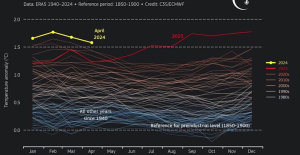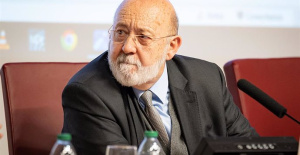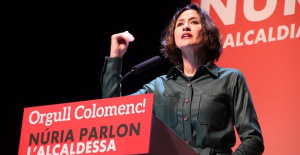Ensures that a SMI equivalent to 60% of the average salary is already a "very demanding" level
MADRID, 31 Ago. (EUROPA PRESS) -
The Minister of Inclusion, Social Security and Migration, José Luis Escrivá, stated this Wednesday that the support of the second vice president, Yolanda Díaz, for the mobilizations announced by the unions against the CEOE to raise wages in Spain "does not torpedo" tripartite social dialogue.
"Nothing is torpedoed. This Government and all the ministers who have to interact with the unions, also Vice President Díaz, have a history of social dialogue and in agreement with the social agents like never before in history and this is going to continue. being so", the minister defended in statements to La Sexta collected by Europa Press.
Escrivá has also denied that the Government has celebrated the advance inflation data for August (10.4%) and has pointed out that, for the Government, the CPI data are "hugely worrying", both in Spain and in Europe. "We are with the maximum tension in the good sense of the word to try to reverse this situation," he stressed.
Asked if the minimum interprofessional salary (SMI) should rise in line with inflation, the minister has limited himself to pointing out that it has to rise until it fulfills the commitment to place it in 2023 at 60% of the average salary, a percentage that he already considers "very demanding".
It will be the Committee of Experts of the SMI, which meets this Friday to start the work, who will decide what is the salary reference to take into account to fulfill that commitment, Escrivá pointed out.
"Depending on what wages rise in Spain in the current situation, it will be necessary to keep pace with the rise in the SMI to reach that level, already very demanding, of 60% of the average salary," he indicated.
As for whether the cost of revaluing pensions with a CPI at high levels can be assumed, the minister has assured that this cost can be absorbed "absolutely" given the good evolution of the Social Security accounts, which this year will cut its deficit to 0.5% of GDP, compared to 0.9% in 2021.
On the other hand, the minister believes that the rise in interest rates that the central banks are applying to tackle inflation will have no effect on employment, since it is based on conditions and levels that are "so lax" that they will not produce a cost credit cash "particularly onerous".
"I don't have the feeling that it will be a difficult situation (...) People who have loans will have to pay a little more but in Spain there are many people who have deposits, who will be paid a little more", he pointed out.
Escrivá has ruled out that Spain is going to start the new course with job destruction, since the data for the month of August are "quite reasonable".
Likewise, and despite the current complex environment, the minister explained that the central scenario in which the Spanish economy is moving points to a slowdown in activity and not to a recession, which would form part of a "low probability" scenario, which could occur in a situation of effective energy restriction in some European countries.

 Exploring Cardano: Inner Workings and Advantages of this Cryptocurrency
Exploring Cardano: Inner Workings and Advantages of this Cryptocurrency Seville.- Economy.- Innova.- STSA inaugurates its new painting and sealing hangar in San Pablo, for 18 million
Seville.- Economy.- Innova.- STSA inaugurates its new painting and sealing hangar in San Pablo, for 18 million Innova.- More than 300 volunteers join the Andalucía Compromiso Digital network in one month to facilitate access to ICT
Innova.- More than 300 volunteers join the Andalucía Compromiso Digital network in one month to facilitate access to ICT Innova.-AMP.- Ayesa acquires 51% of Sadiel, which will create new technological engineering products and expand markets
Innova.-AMP.- Ayesa acquires 51% of Sadiel, which will create new technological engineering products and expand markets April 2024 was the hottest on global records
April 2024 was the hottest on global records Tezanos charges against the PP for its "dirty war" against the CIS and says that the JEC does not adhere to the principle of legality
Tezanos charges against the PP for its "dirty war" against the CIS and says that the JEC does not adhere to the principle of legality Illa promises to appoint Parlon Minister of the Interior and Trapero Director General of Mossos
Illa promises to appoint Parlon Minister of the Interior and Trapero Director General of Mossos Unions are mobilizing today to achieve labor and salary improvements in the Tax Agency
Unions are mobilizing today to achieve labor and salary improvements in the Tax Agency How Blockchain in being used to shape the future
How Blockchain in being used to shape the future Not just BTC and ETH: Here Are Some More Interesting Coins Worth Focusing on
Not just BTC and ETH: Here Are Some More Interesting Coins Worth Focusing on They develop devices for the precise diagnosis of cancer patients
They develop devices for the precise diagnosis of cancer patients UMH researchers are working on a high-quality apricot crop that requires less irrigation water
UMH researchers are working on a high-quality apricot crop that requires less irrigation water The UPV develops an application to improve the quality of life of patients with glioblastoma
The UPV develops an application to improve the quality of life of patients with glioblastoma A sensor system obtains the fingerprint of essential oils and detects if they have been adulterated
A sensor system obtains the fingerprint of essential oils and detects if they have been adulterated A million people demonstrate in France against Macron's pension reform
A million people demonstrate in France against Macron's pension reform Russia launches several missiles against "critical infrastructure" in the city of Zaporizhia
Russia launches several missiles against "critical infrastructure" in the city of Zaporizhia A "procession" remembers the dead of the Calabria shipwreck as bodies continue to wash up on the shore
A "procession" remembers the dead of the Calabria shipwreck as bodies continue to wash up on the shore Prison sentences handed down for three prominent Hong Kong pro-democracy activists
Prison sentences handed down for three prominent Hong Kong pro-democracy activists ETH continues to leave trading platforms, Ethereum balance on exchanges lowest in 3 years
ETH continues to leave trading platforms, Ethereum balance on exchanges lowest in 3 years Investors invest $450 million in Consensys, Ethereum incubator now valued at $7 billion
Investors invest $450 million in Consensys, Ethereum incubator now valued at $7 billion Alchemy Integrates Ethereum L2 Product Starknet to Enhance Web3 Scalability at a Price 100x Lower Than L1 Fees
Alchemy Integrates Ethereum L2 Product Starknet to Enhance Web3 Scalability at a Price 100x Lower Than L1 Fees Mining Report: Bitcoin's Electricity Consumption Declines by 25% in Q1 2022
Mining Report: Bitcoin's Electricity Consumption Declines by 25% in Q1 2022 Oil-to-Bitcoin Mining Firm Crusoe Energy Systems Raised $505 Million
Oil-to-Bitcoin Mining Firm Crusoe Energy Systems Raised $505 Million Microbt reveals the latest Bitcoin mining rigs -- Machines produce up to 126 TH/s with custom 5nm chip design
Microbt reveals the latest Bitcoin mining rigs -- Machines produce up to 126 TH/s with custom 5nm chip design Bitcoin's Mining Difficulty Hits a Lifetime High, With More Than 90% of BTC Supply Issued
Bitcoin's Mining Difficulty Hits a Lifetime High, With More Than 90% of BTC Supply Issued The Biggest Movers are Near, EOS, and RUNE during Friday's Selloff
The Biggest Movers are Near, EOS, and RUNE during Friday's Selloff Global Markets Spooked by a Hawkish Fed and Covid, Stocks and Crypto Gain After Musk Buys Twitter
Global Markets Spooked by a Hawkish Fed and Covid, Stocks and Crypto Gain After Musk Buys Twitter Bitso to offset carbon emissions from the Trading Platform's ERC20, ETH, and BTC Transactions
Bitso to offset carbon emissions from the Trading Platform's ERC20, ETH, and BTC Transactions Draftkings Announces 2022 College Hoops NFT Selection for March Madness
Draftkings Announces 2022 College Hoops NFT Selection for March Madness




























